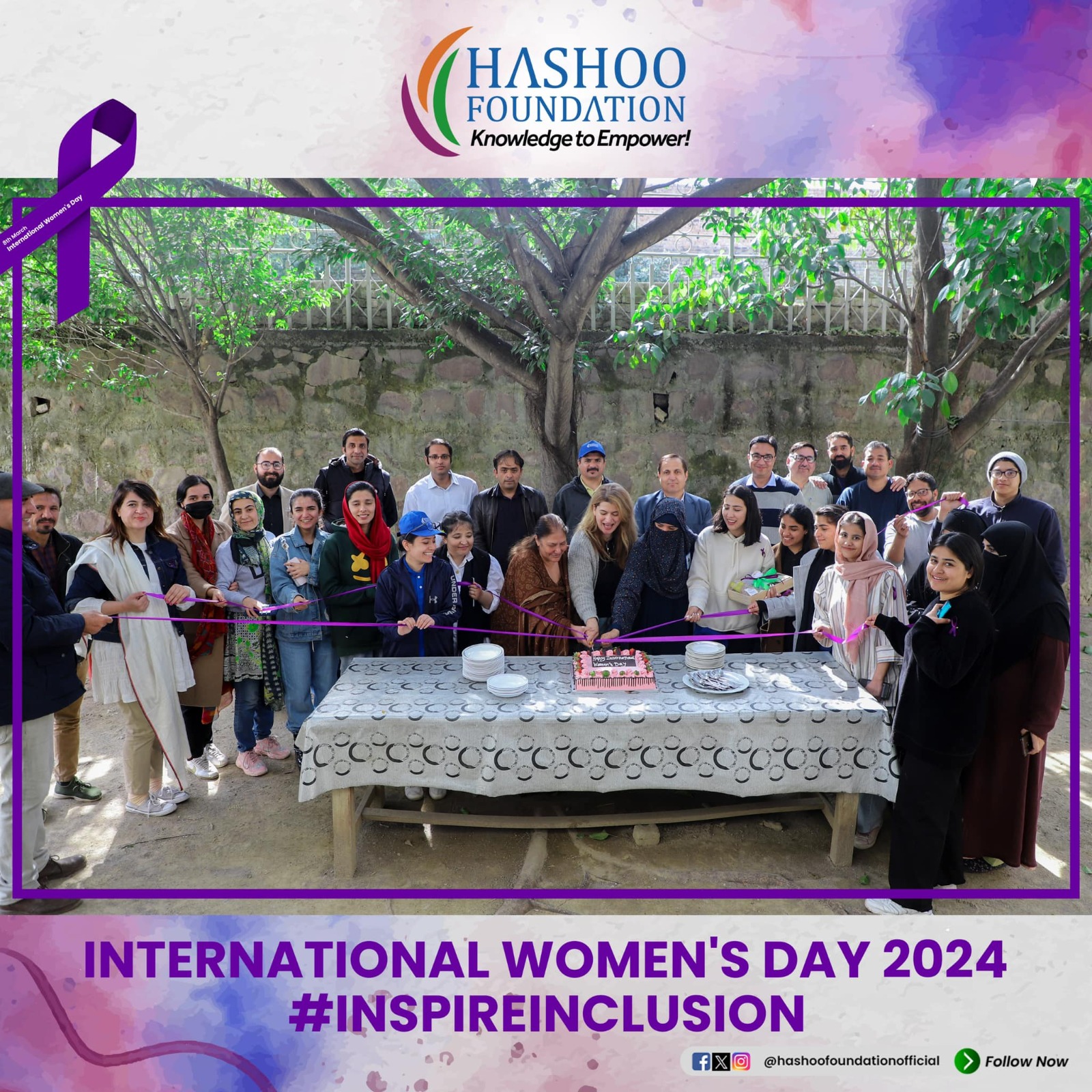Success Story
Mainstreaming Gender in Organizational Systems
May 30, 2024
Background
In Pakistan, New Partnerships Initiative EXPAND: New Partners for Better Health (NPI EXPAND) is implementing USAID’s Human Development Activity (HDA) to advance locally led development in elementary and primary education, family planning (FP), and maternal, newborn and child health (MNCH), in Buner and Upper Dir districts in Khyber Pakhtunkhwa (KP) province. NPI EXPAND HDA has focused on gender transformative change in all the projects that it has supported. Local partners have focused on increasing girls’ access to education and expanding women and girls’ access to quality FP and MNCH services. They have extended their gender mainstreaming efforts beyond project activities by reviewing their staffing structures and organizational policies to integrate gender across their organizations.
NPI EXPAND HDA’s gender approach aligns with USAID’s Gender Equality and Women’s Empowerment Policy 2023, which affirms that gender equality and women’s and girls’ empowerment are fundamental for the realization of human rights and key to achieving effective and sustainable development outcomes.[1]
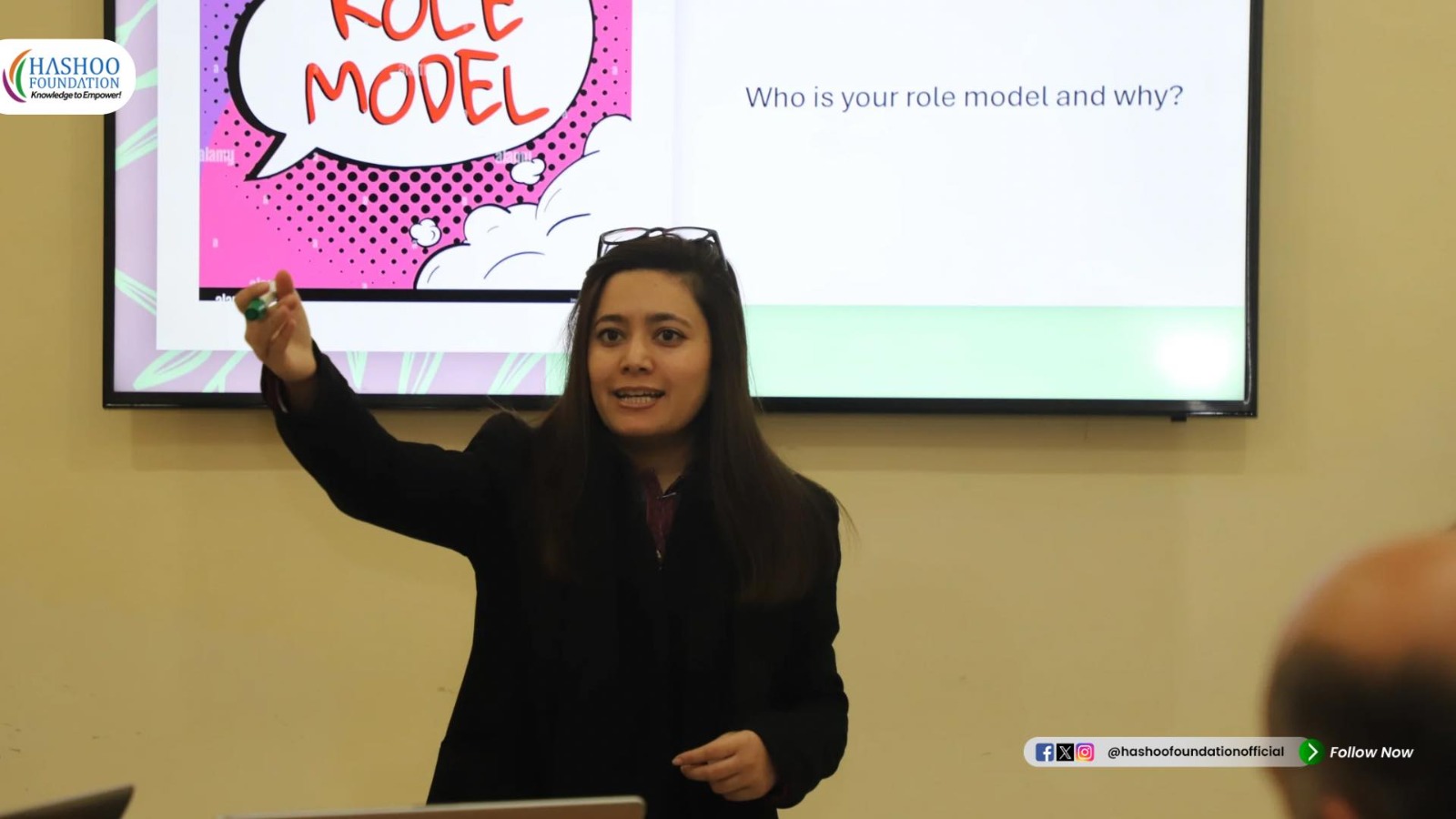 Identifying Gaps and Needs
Identifying Gaps and Needs
NPI EXPAND HDA identified the need for capacity strengthening on gender among its local partners during baseline organizational capacity assessments conducted from May-October 2022 using the Organizational Capacity Assessment and Organizational Performance Index tools. Areas for strengthening included strategies, policies, safeguarding, grievance redressal mechanisms, and gender balance in staffing and on boards. NPI EXPAND conducted a series of in-person and virtual training workshops on gender mainstreaming and integration for partners from March 2023-March 2024. These focused on gender terms and concepts, the gender integration continuum, gender analysis, and key elements of organizational gender mainstreaming and integration. The learnings from the workshops encouraged partners to take active steps to mainstream and integrate gender in their organizations.
Partners were also introduced to NPI EXPAND’s Organizational Gender Assessment tool. This helped partners assess what gender mainstreaming and integration policies were already in place within their organizations and which ones needed to be added or revised, including for finance, procurement, and operations. A participant said, “This workshop gave clear direction to achieve gender mainstreaming in a systematic way and the organizational gender assessment provided deep insight into the current status of gender issues.”
Policies and Practices
Follow ups with partners on their organizational gender assessments in March 2024 revealed that organizations had taken practical steps to integrate changes in their organizational policies and practices. The Human Development Foundation, the Hashoo Foundation and the Association for Mothers and Newborns (AMAN) said that they have identified gender focal persons; AMAN has also dedicated a separate space for childcare and nursing for new mothers on its staff. Greenstar Social Marketing have indicated their desire to have a full-time gender focal person, a crucial first step.
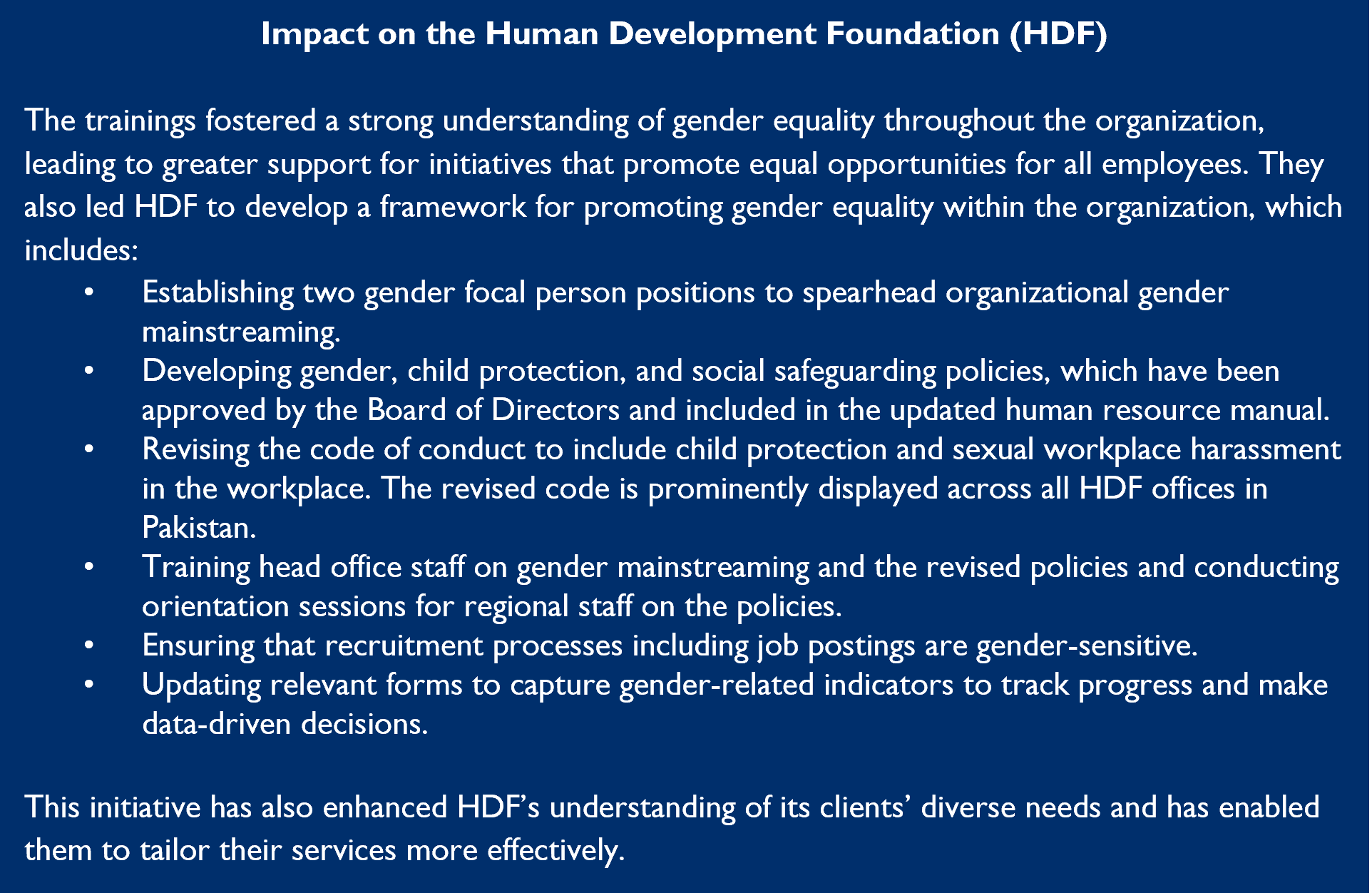
Several grantees have begun training their staff on gender. The Foundation for Rural Development has trained its field and core teams including human resource and finance; the Community Uplift Program also ensured participation of its human resource, administrative, and finance staff in NPI EXPAND’s training. One of their staff said, “Based on the newly acquired knowledge, we reviewed all our policies including our five-year strategic plan; these have been submitted to the Board of Directors for approval. We also developed a new gender policy, which was earlier part of our anti-harassment policy.” They plan to hire a gender focal person in future, are reviewing their human resource policies for gender inclusion, and are incorporating provisions for maternity and paternity leave and flexible working hours.
The Hashoo Foundation and the Sustainable Development Policy Institute said that they have increased the focus on gender in their communication strategies. Staff safety and security were also identified as key areas following the workshops. AMAN said that it provides complete protection to its female staff when traveling in high-risk areas. Similarly, the Community Uplift Program said that they provide a pick and drop service for their female staff and a dedicated security guard for female staff members at field sites.
Partners have also reviewed their human resource policies to ensure that they are gender conscious, such as the National Integrated Development Association (NIDA)-Pakistan who reviewed their recruitment and hiring practices including job advertisements, application forms, and interview processes to ensure that women have equal opportunity to apply for jobs. They also reviewed salaries, benefits, career development and promotion structures to ensure that these are equitable. Finally, they updated policies on prevention of sexual harassment and gender-based violence in the workplace and oriented staff on these.
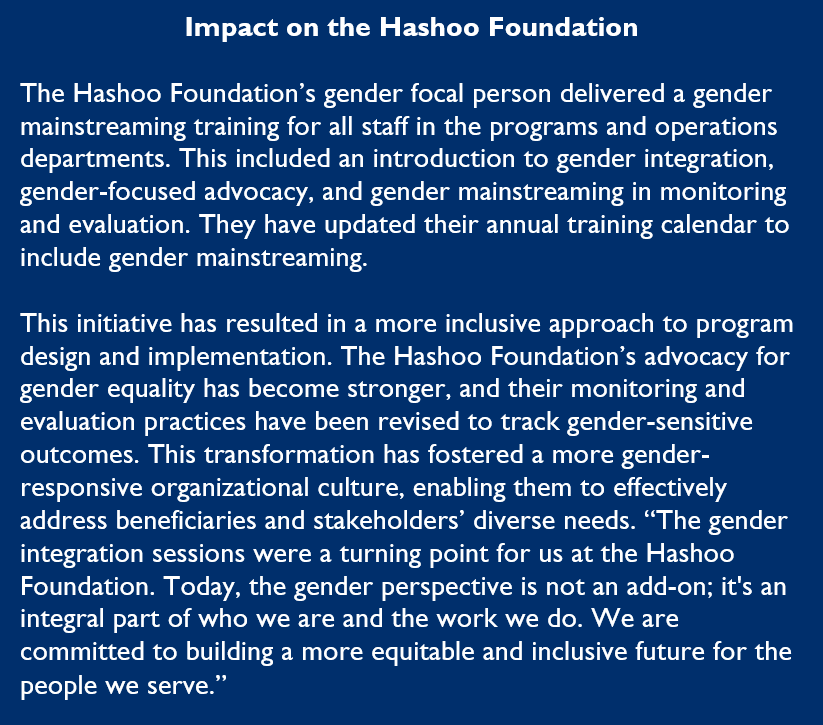
Some partners also said that after the gender mainstreaming and integration workshops, newly hired staff members including finance, operations, and procurement, are briefed on organizational policies such as maternity and paternity leave, gender mainstreaming, risk assessment, safeguarding, child protection, safety disclosures and sexual harassment to help ensure compliance.
The Hashoo Foundation integrated gender into its procurement policy. As a result, United Nations gave the Hashoo Foundation Pre-Qualified Procurement (PQP) status, which qualifies the organization to do procurements for all UN agencies. A representative from the Hashoo Foundation highlighted the organization’s gender integration efforts: “We incorporated gender mainstreaming, equal gender representation, women’s empowerment, and community stories about women in our revised communication strategy. We are amplifying the voices and experiences of all those we impact through video and written testimonials and photos of events and project interventions featuring female and male beneficiaries. In areas where video recordings of women are not permitted due to societal norms, we use voice recordings and interviews without showing their faces to ensure their anonymity and privacy.” Since the Foundation’s internal audit representative participated in NPI EXPAND HDA’s gender integration and mainstreaming training, he ensured that the learnings were included in the organization’s updated policies including the gender, risk assessment and anti-harassment policies.
The Peace and Development Organization said that they are striving to change their gender gap in staffing identified through the organizational capacity assessment since they feel that they cannot justify working for women and children without more female staff. The assessment revealed that 90% of the management committee and staff are male. They plan to develop a gender policy, add women to their finance team and increase the overall gender balance in their staff in the long term. While much work is ahead for the organization to mainstream gender within their organizational systems and structures, these insights on their management committee and staffing structure are crucial first steps in making informed, intentional changes with regards to gender within the organization.
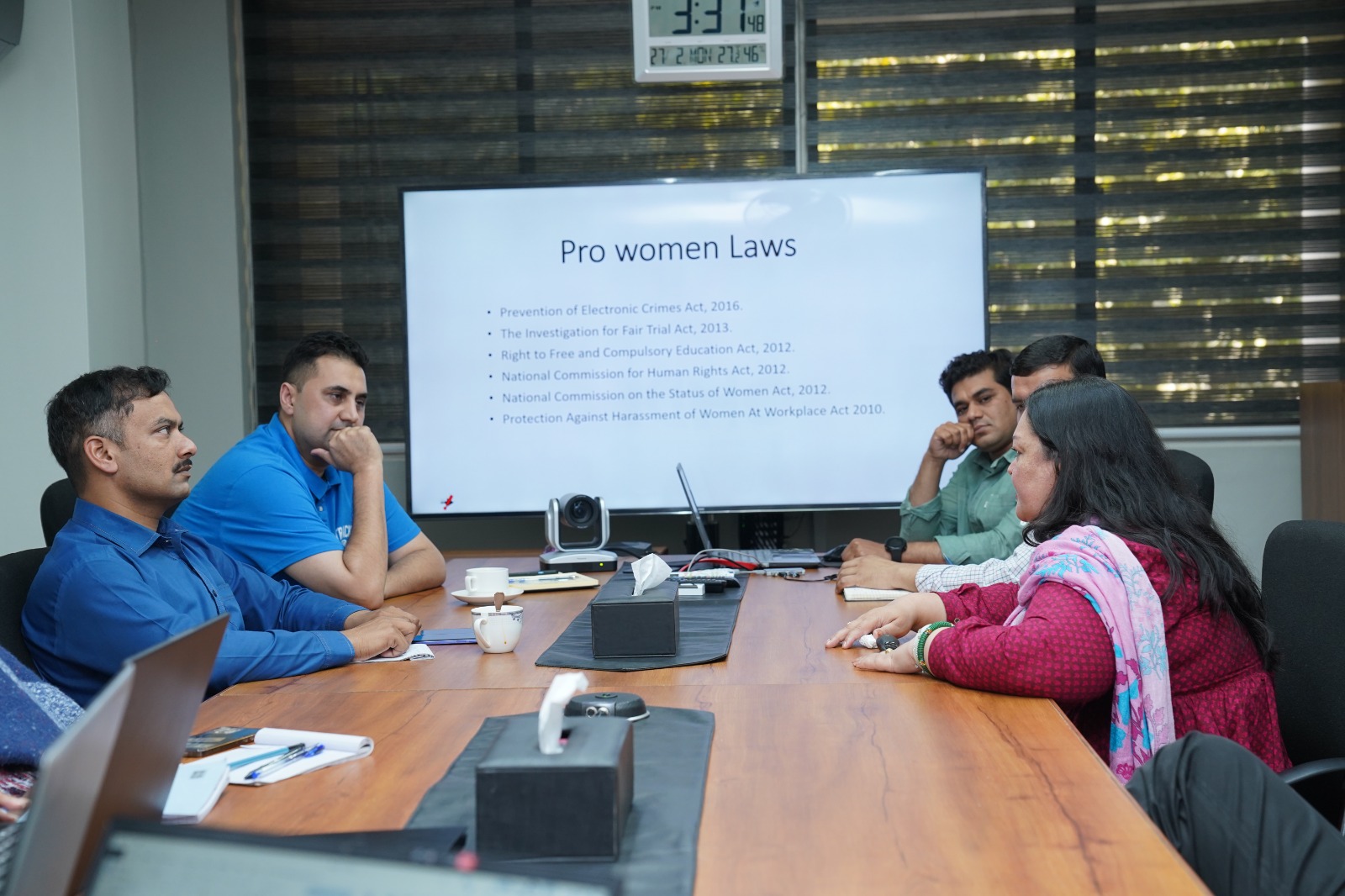
NIDA-Pakistan plans to increase the number of women in its project staff and senior management team. The Sustainable Development Policy Institute recognizes the need to allocate space for childcare and develop a personnel policy for staff travelling with young children. Saibaan Development Organization said that the organizational gender assessment helped them identify gaps in areas they had not considered earlier and the training highlighted the need to revise their gender policy and technical strategies. The Community Uplift Program said that the training gave them impetus to increase their focus on gender mainstreaming by revising their gender and travel policies. They plan to identify a gender focal person and allocate space for breastfeeding. Takal Welfare Organization found the assessment tool very helpful especially for developing organizational policies and their focus on gender and policy revision is speeding up as a result of this process. The Participatory Rural Development Society is adding a safeguarding policy and planning to amend their gender focal person’s job description. These plans lay important foundations for future work in gender mainstreaming within the organizations.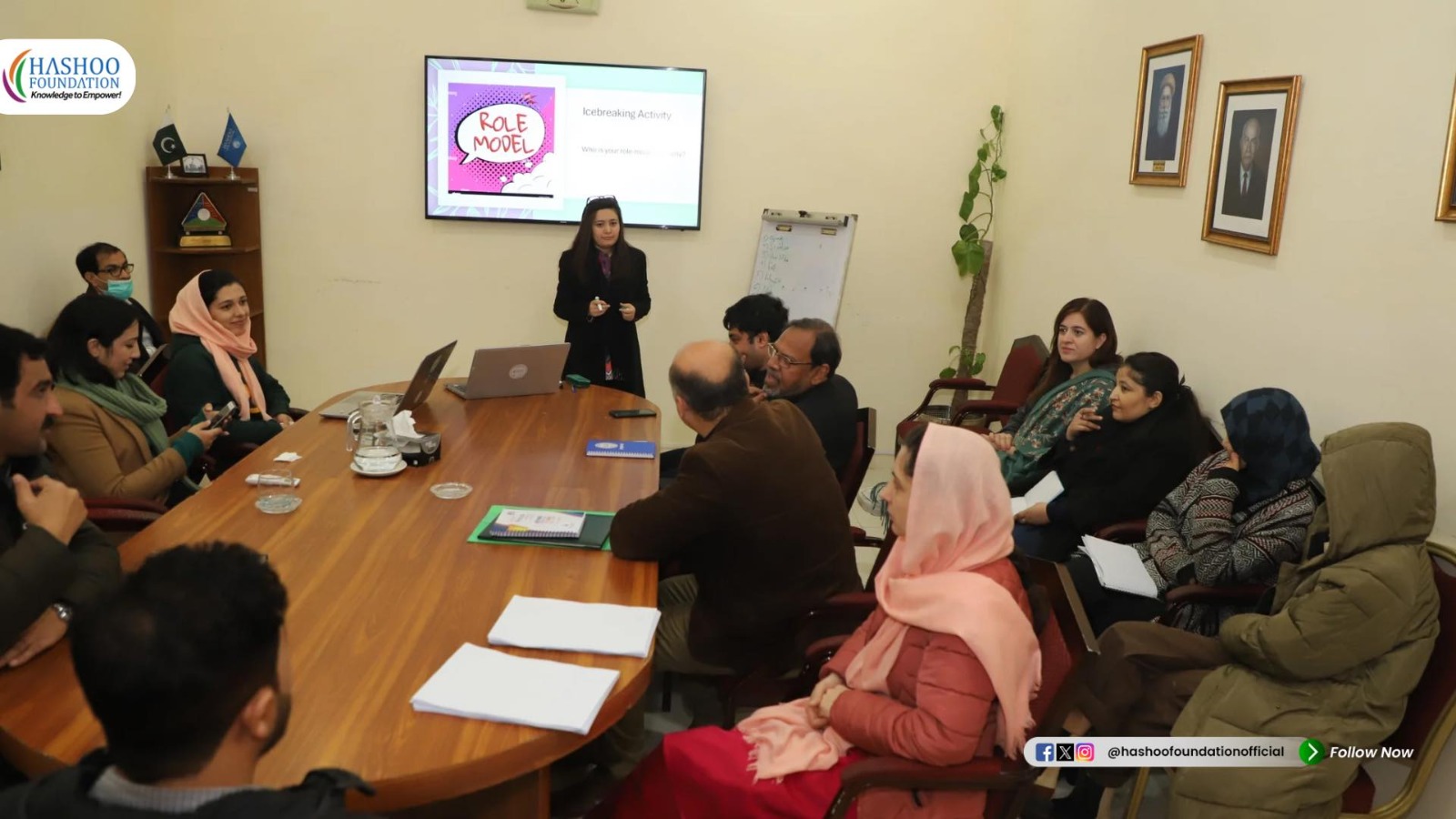
As noted by Fatimata, Assistant Manager, Human Resources, for NPI EXPAND HDA partner Human Development Foundation (HDF), “The gender mainstreaming initiative has been a game-changer for HDF. It has really helped us create a more inclusive and equitable workplace for everyone, while strengthening our institutional framework to promote gender equality across all our operations.” HDF’s organizational changes are highlighted in the box below.
Sustainable Outcomes
NPI EXPAND HDA and its partners’ gender mainstreaming and integration interventions are yielding sustainable outcomes within organizations and communities. In the remaining months of the project, which comes to an end in July 2024, the integration of gender-based policies and practices within partner organizations is essential for ensuring sustained progress beyond project completion. Assigning dedicated Gender Focal Persons and implementing gender mainstreaming and integration trainings, which several partners have begun doing, demonstrates a shift in organizational attitudes towards gender equality, fostering lasting organizational change.
NPI EXPAND HDA’s partners are also helping to ensure a move towards gender transformative approaches through mainstreaming and integrating gender in proposals for future projects. Investing in gender-focused interventions will benefit partner organizations to strengthen their organizational processes and help transform community perspectives on gender, ultimately encouraging positive outcomes at the community level.